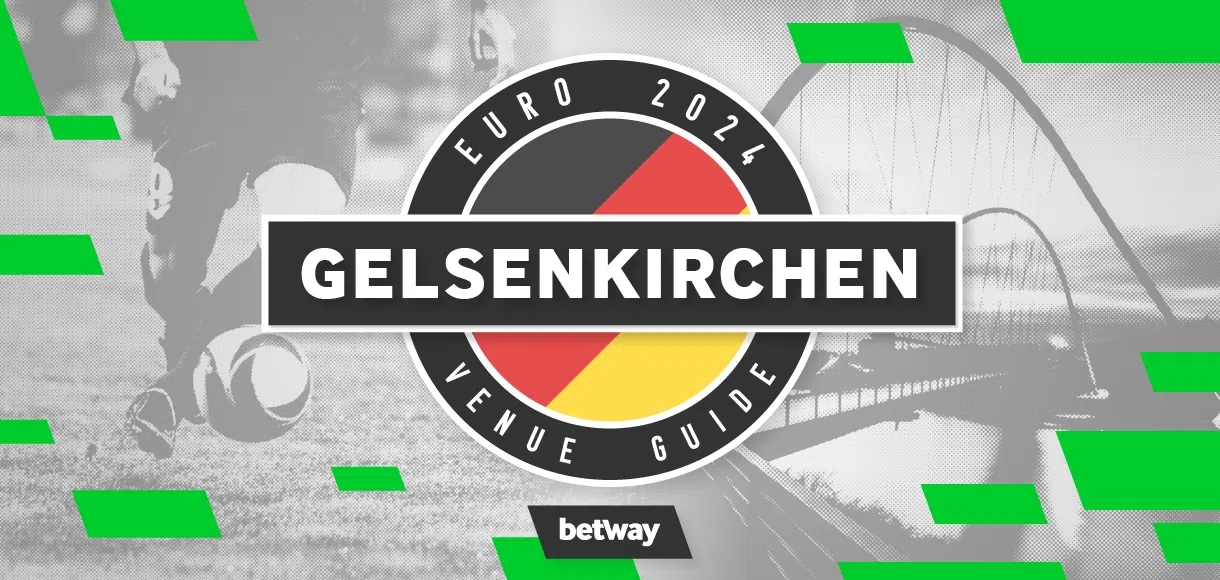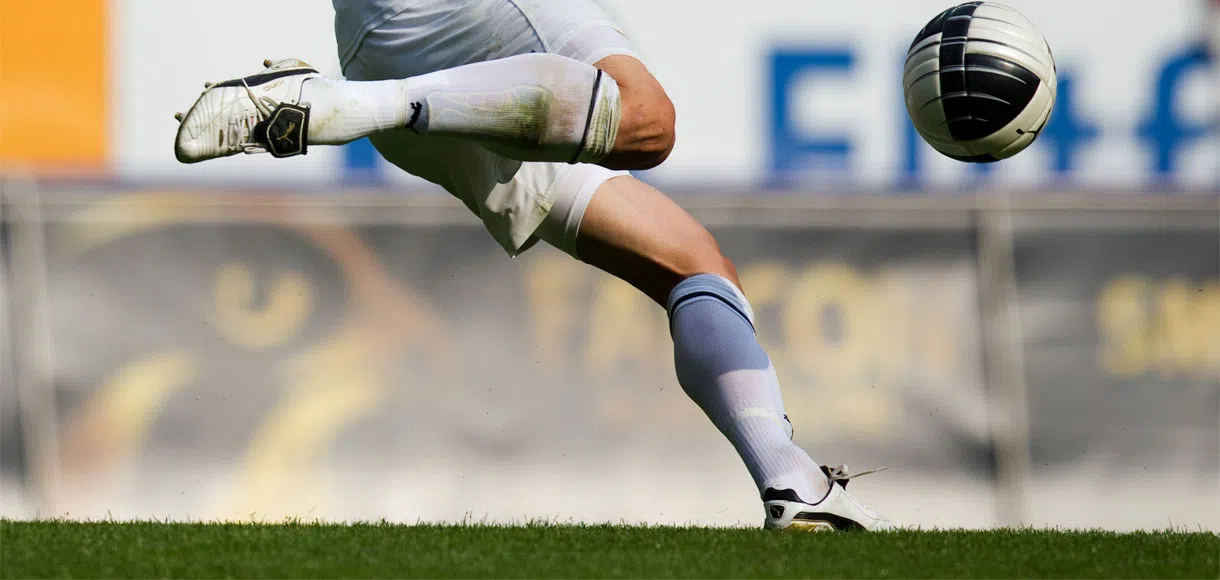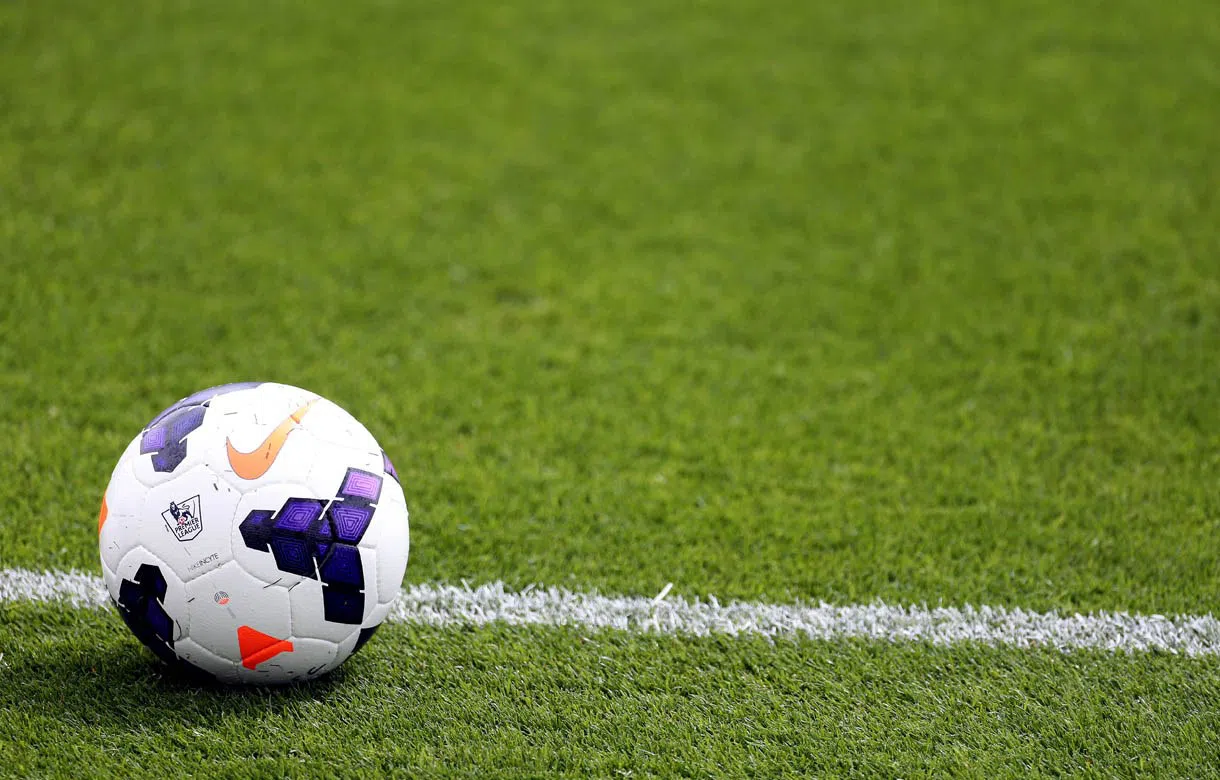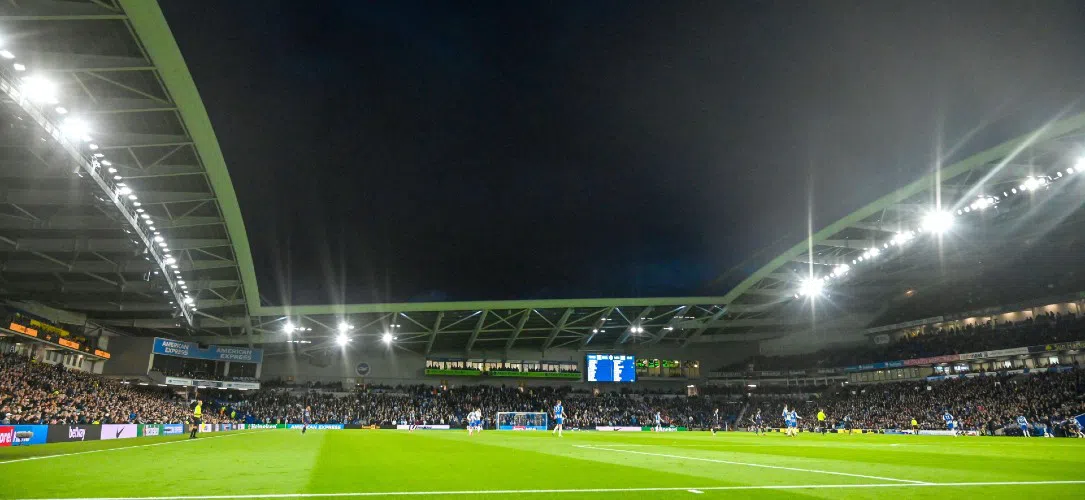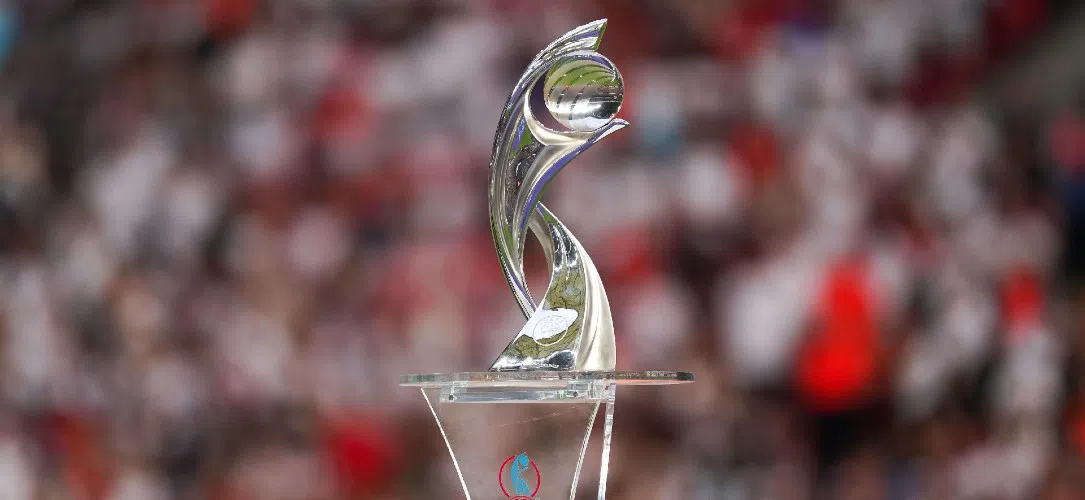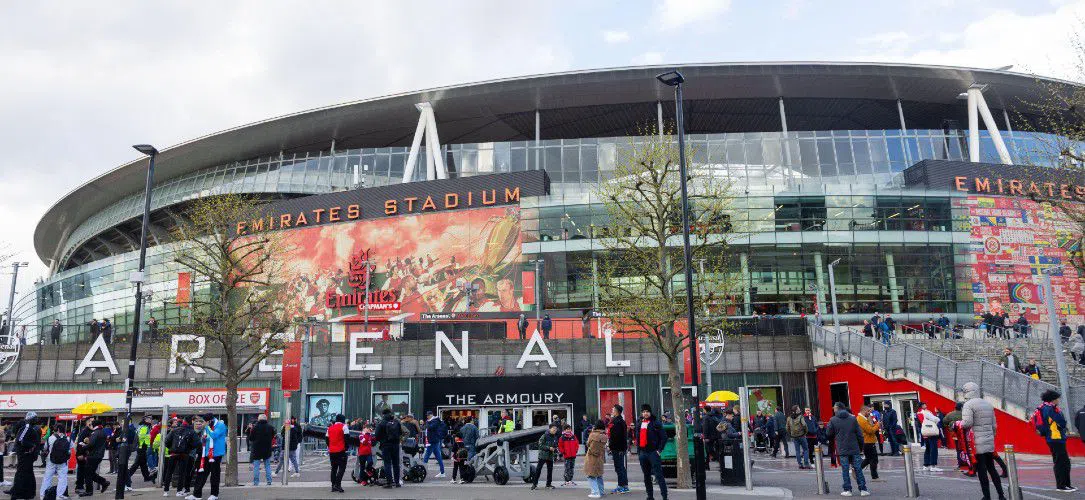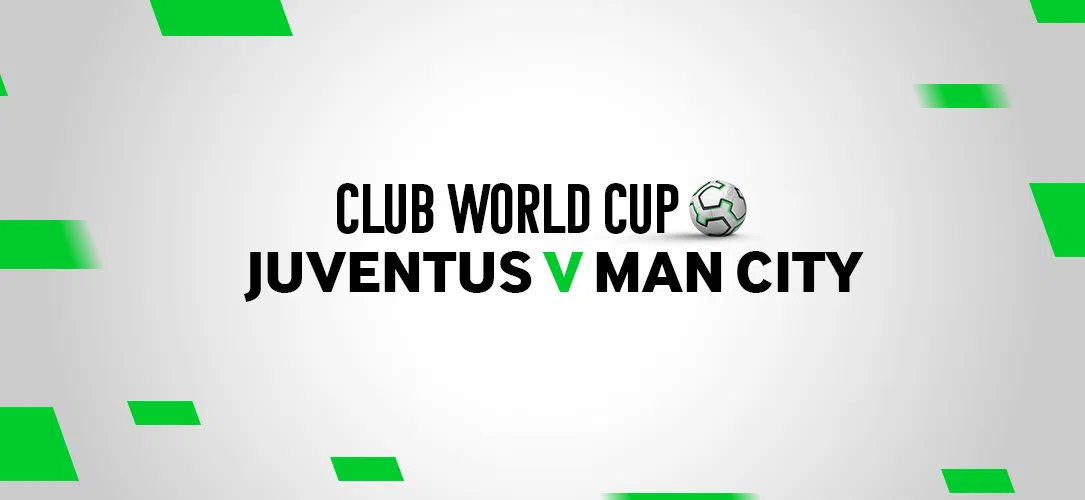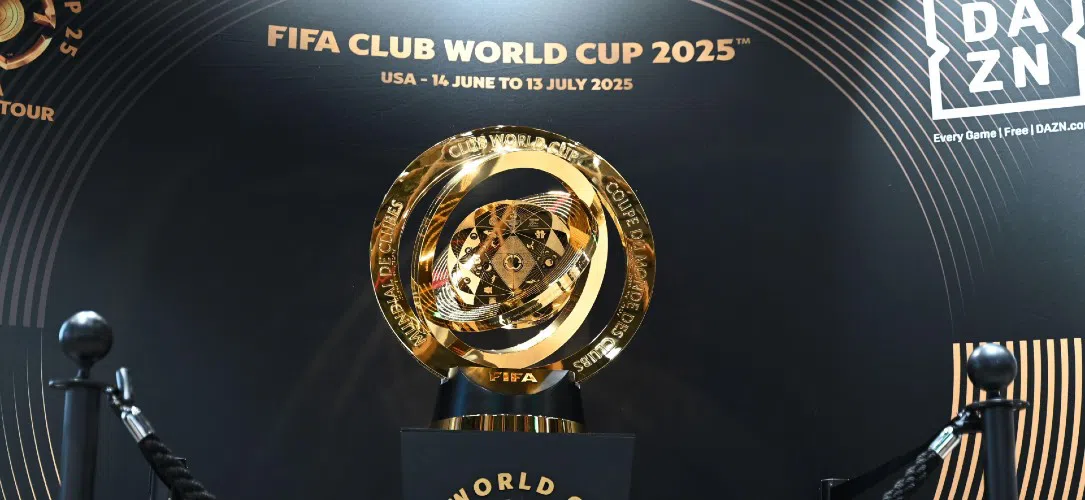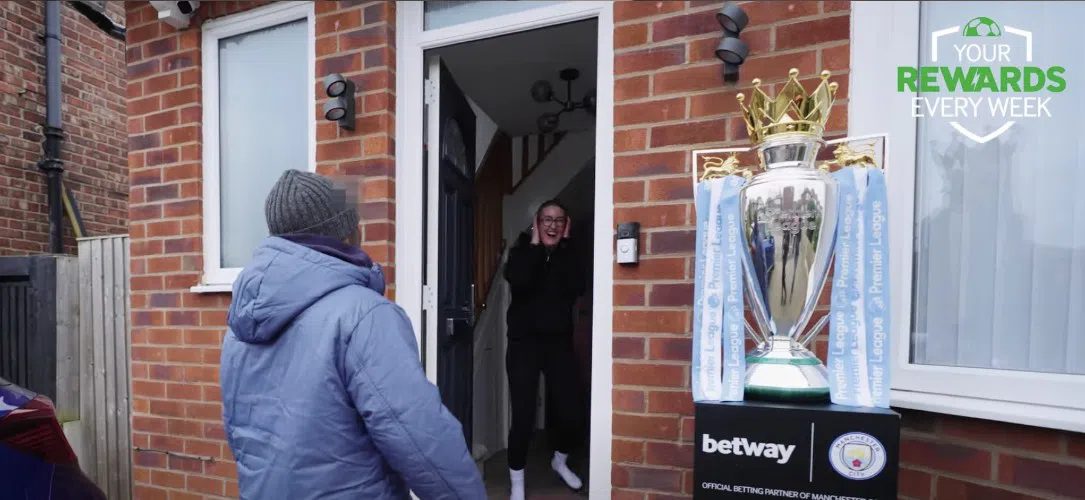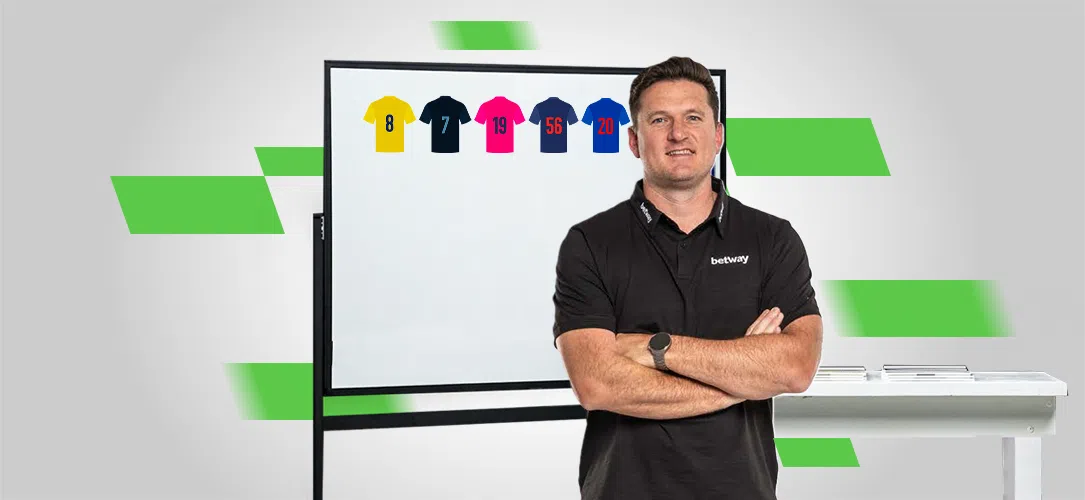From matches to the fan zone, places to stay and things to do, discover our guide to Gelsenkirchen for the 2024 Euros, for a fantastic football-filled trip.
The Euros is just around the corner now, and one German city that’s excitedly gearing up to host some of the games is the former mining city of Gelsenkirchen. Guaranteed to be one of the best footballing summers, alongside other host cities, Gelsenkirchen’s plans are well underway, to provide fans with a Euros they’ll never forget!
If you’re travelling over to Germany for the excitement – whether you’ve gotten tickets for multiple matches, one game, or you plan on spending most of your time in the fan zone, soaking up the atmosphere – we’ve got you covered.
Not only have we created a complete guide to the 2024 Euros in Gelsenkirchen, but we’ve also created guides for all of the host cities, providing you with every little bit of information you could possibly need, to enjoy your time to the max. So, read on to discover what to do in Gelsenkirchen for the Euros, or explore all the latest Euro 2024 odds ahead of your trip.
In this guide:
· Which Euro 2024 matches are being held in Gelsenkirchen?
· Visiting Gelsenkirchen’s arena
· Where is the Euro 2024 fan zone in Gelsenkirchen?
· How to get from Dusseldorf airport to Gelsenkirchen
· Where to stay in Gelsenkirchen for Euro 2024
· How to travel around Gelsenkirchen
· Where to eat in Gelsenkirchen
· Gelsenkirchen’s most picturesque photo spots
· The best day trips from Gelsenkirchen
· Final things to know before visiting Gelsenkirchen for the Euros
· Explore the other Euro 2024 host cities
Which Euro 2024 matches are being held in Gelsenkirchen?
Gelsenkirchen’s Veltins arena is set to host four matches in total, including three of the first ones, and one round of 16. The teams set to play are:
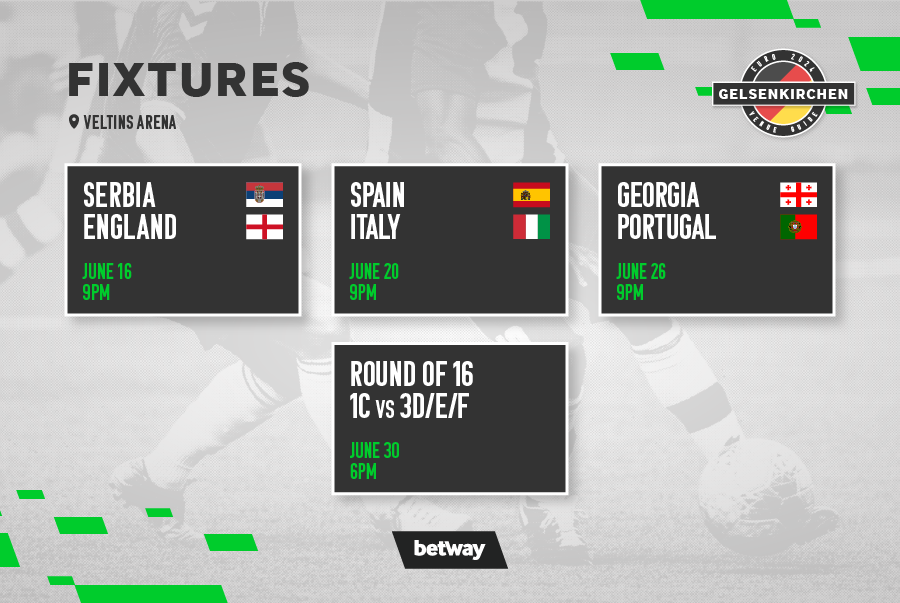
With England one of the favourites to win, it’s guaranteed to be a great game, but no matter which match you watch, you’re sure to have an amazing time!
Visiting Gelsenkirchen’s arena
Also known as AufSchalke, Veltins Arena has a league capacity of 62,271, and an international capacity of 54,740 – so, there’s plenty of space for the Euros!
How to get to Veltins Arena
Also known as AufSchalke, Veltins Arena has a league capacity of 62,271, and an international capacity of 54,740 – so, there’s plenty of space for the Euros!
How to get to Veltins Arena
Situated 8km out of the city centre, Veltins arena can easily be reached on public transport in just under half an hour. No matter whereabouts you’re staying in Gelsenkirchen, you’ve got plenty of options when it comes to making your way to the arena. Plus. like other host cities in Germany, if you’ve got a ticket for one of the matches, you can claim a free 36-hour travel pass, that’s valid from 6am on match day, through to 6pm the following day.
The VRR and VRS networks also cover nearby Cologne, Dortmund, and Dusseldorf, which are also host cities for the Euros!
· U-Bahn/tram: The arena has its own dedicated stop right outside the entrance – catch the 302 line from the train station, and it’s just 12 stops away.
· Bus: Gelsenkirchen Verkehrshof is the closest bus stop, which is a 15-minute walk from the arena; with the 342 and NE11 buses both stopping here.
Where to park at Veltins Arena
You can prebook a space at the arena for €24 per match, on a first come, first serve basis, and they’re no more than a 10-minute walk to the venue. Don’t try and turn up on match day, as you’ll be turned away if you don’t have a parking pass.
Not all parking spaces are accessible, but there are dedicated spots available for wheelchair and easy access ticket holders.
Ultimately, if you can avoid driving in, we’d recommend catching public transport instead, and making use of your free travel pass.
Veltins Arena history
Opened in 2001, the arena features a convertible roof and retractable lawn, and has played host to many sporting events, including the 2010 Ice Hockey World Champions, the UEFA Champions League Final in 2004, and now, the 2024 Euros!
Veltins is home to FC Schalke 04, which were in the Bundesliga until they were relegated in the 2022/23 season. Despite that, they’re officially the second largest football club in Germany, if you count membership numbers. Over the years, they’ve won one UEFA Cup, and seven German championships.
Best Veltins Arena selfie spots
With a couple of key selfie-worthy spots, these are the places to visit at Gelsenkirchen’s Veltins Arena ahead of the match, to get that all important picture for Instagram.
· Outside the arena: Get there early and take a selfie right outside the front of the stadium, with the blue and white backdrop – and capture the start of the atmosphere in the lead up to the game.
· Schalke Museum: Located in the arena, take a selfie with the history of FC Schalke 04 behind you. Spanning 600 square metres, discover key mementos from the 1958 championship, 1972 cup victory, and so much more.
Realistically, no matter where you are in the arena, you’re bound to get some great pictures – whether you’re standing in the lobby, or at your seat. With so many fans milling around, you’ll truly be able to capture the atmosphere of the 2024 Euros, and make memories that will last a lifetime.
Refreshments at Veltins
On a standard gameday at the Veltins Arena, the stadium offers 31 independent food stalls, which equates to a stand per 1,613 supporters. This places Gelsenkirchen as offering the fourth-best food and drink availability of all Euro 2024 hosts, behind Hamburg (1,609), Leipzig (1,028), and Dortmund (396).
Meanwhile, in terms of the cost of food and drink in Gelsenkirchen, expect a relatively affordable experience, with bratwursts priced at just €3.30 – the cheapest of all host venues. That said, on the other hand, soft drinks here can cost upwards of €4.90 – no other Euro 2024 arena charges more!
Veltins Arena rules
Before you head to the match, make sure you have a read up on the rules and regulations, so you don’t get caught out. Here are a few key things to consider when visiting the Gelsenkirchen arena:
· Bags: Any bags that are bigger than A4 size won’t be allowed in the stadium, but there will be bag drops available that you can leave them in, at your own risk.
· Power banks: You’re allowed to bring a power bank with you, provided it’s no larger than your phone.
· Smoking: Veltins – like the rest of Germany’s arenas – is a smoke-free venue, which means you can’t smoke, vape, or use heat-not-burn tobacco products.
· ID: The venue advises that you keep a valid form of ID on you at all times.
· Flags: You can cheer your team on, but flags and banner poles can’t be more than 1 metre long and 1cm in diameter; and signs and banners can’t be any larger than 2×1.5 metres.
· Cameras: While you can take as many pictures or videos on your phone as you like, professional photography equipment isn’t allowed, and you’re prohibited from filming for commercial purposes.
· Umbrellas: You’re allowed to bring a small, fully collapsable umbrella with you, but cane umbrellas can’t be taken into the arena.
Where is the Euro 2024 fan zone in Gelsenkirchen?
Former colliery-turned landscape park, Nordsternpark will be the official fan zone in Gelsenkirchen. Already used as a place for concerts, you’ll be able to watch all of the matches here, as well as get involved in lots of exciting footballing events throughout the month.
How to get to the Euro 2024 fan zone in Gelsenkirchen
To get to Nordsternpark from the arena, it’ll take you just under an hour on public transport. The easiest way is to take the 302 tram to Kennedyplatz, and then change onto the 383 bus at Gelsenkirchen Musiktheater, and go 10 stops to GE Landschaftspark Heßler.
Alternatively, if you’re making your way there from the train station, then simply get on the 383 bus, which also stops outside the station, and will get you to Nordsternpark in half an hour.
If, for whatever reason, you’re short on time when coming out of the arena, a taxi will cost more, but should get you to the fan zone in no more than 15 minutes.
Gelsenkirchen Euro 2024 fan zone entry requirements
Like with all other fan zones across Germany, Gelsenkirchen’s is free to enter, and there aren’t any specific requirements. So, just turn up, be respectful, and have fun!
Euro 2024 fan zone activities
Alongside public viewing of the matches at Nordsternpark’s amphitheatre, there will be lots of other activities to get involved in, to make your trip to the 2024 Euros one to remember.
There will be plenty of food and drink stalls, several football-related activities, on-stage music and talks, and even an eSports lounge.
Other places to watch Euro 2024 games in Gelsenkirchen
If you’d rather watch the games somewhere other than the official fan zone, then the good news is there will be plenty of pubs and bars around the city that will be showing them! Just don’t forget to check in advance if you need to book a table.
Some of the top-rated sports bars in Gelsenkirchen include:
· Traber-Kneipe Sportsbar (4.8-rated on Google, from 15+ reviews)
· Destille Buer (4.5-rated on Google, from 250+ reviews)
· Vereinslokal Schalke 04 “Bosch” (4.7-rated on Google, from 500+ reviews)
How to get from Dusseldorf airport to Gelsenkirchen city centre
The closest airport to Gelsenkirchen is Dusseldorf, which is around 45km away, and offers a couple of ways of getting to the city centre.
· Train: Take the RE2 or RE3 line from Dusseldorf airport, and it’ll take you directly to Gelsenkirchen’s train station, in around 35-50 minutes, depending on if you get the fast train, or not.
· Taxi: Alternatively, if you’re looking for door-to-door transportation, then a taxi is your best option. It’s considerably more expensive, at around €100, but will get you to where you need to be in around 45 minutes. You can either hail a cab at the airport, or order an Uber or Bolt.
Alternatively, if you’re already in Germany for the Euros, then you might be hopping between a couple of cities. Gelsenkirchen is within easy reach from Dortmund, Dusseldorf, and Cologne by train, taking 35 minutes, 45 minutes, and 2 hours 10, respectively.
Where to stay in Gelsenkirchen for Euro 2024
One key thing to think about when booking a holiday, is whereabouts to stay in the city. With a population of just 260,000, Gelsenkirchen is compact and easily navigable, which helps to narrow down the options when it comes to choosing where to stay.
Mitte
If you want to be in the heart of the action, and within easy access of both the arena and the fan zone, Mitte is the place to be. Not only are there plenty of hotels, cafes, and restaurants, but most of Gelsenkirchen’s top attractions are found here.
Schalke
Close to Nordsternpark, Schalke is the ideal place to stay if you want to be near the official fan zone. This area is also home to Gelsenkirchen’s zoo, and it’s got a great live music scene, too.
Gelsenkirchen-Ost
This is the handiest neighbourhood for Veltins Arena, with the city centre accessible in around 20-30 minutes via public transport. Accommodation here tends to be cheaper, which is ideal if you’re on a budget.
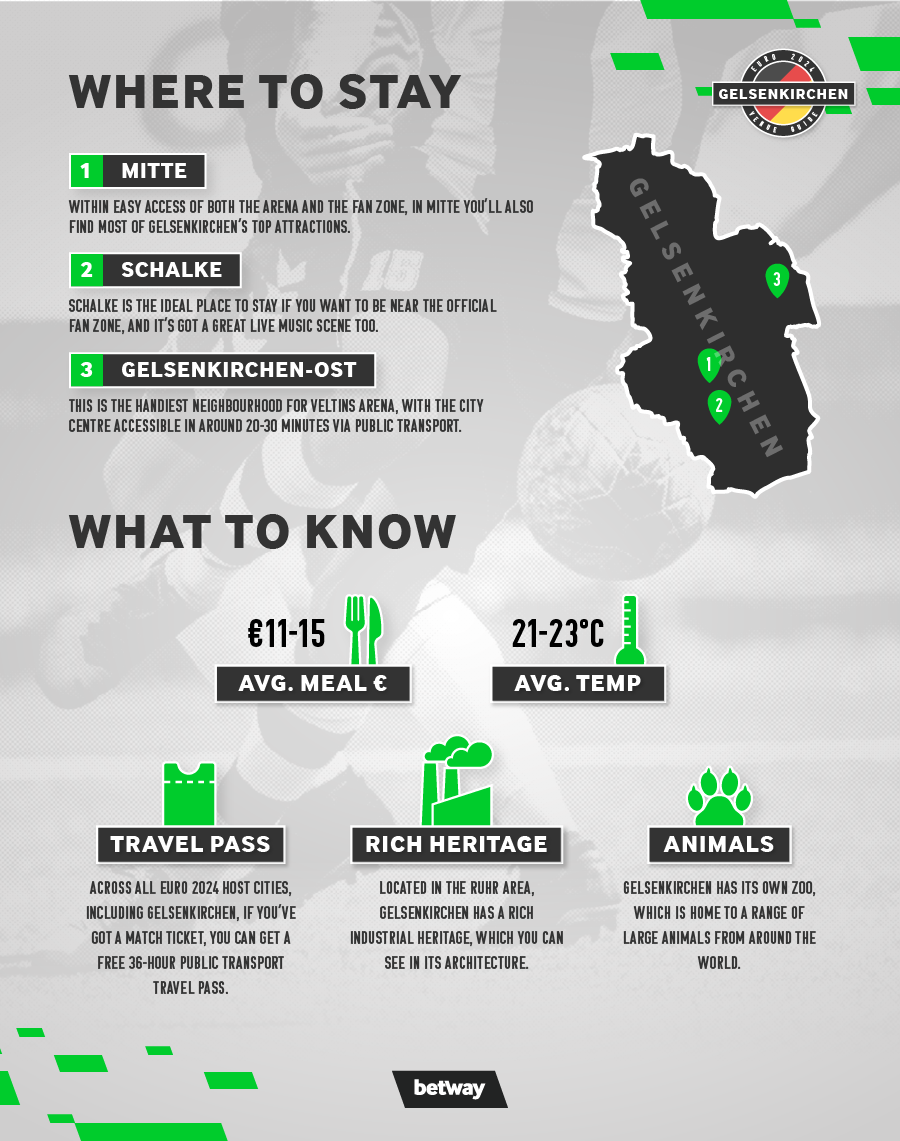
How to travel around Gelsenkirchen
Being a smaller city, Gelsenkirchen doesn’t have as extensive a public transport system as other larger cities, simply because it doesn’t need it! However, their transport is extremely easy to use, and you’ll need it if you want to get to the arena, the fan zone, and the city centre.
The two modes of transport you’ll use around the city are:
· U-Bahn/tram: Also known as Straßenbahn, it has three lines that run through Gelsenkirchen, and neighbouring Bochum. The tracks run for 84km, and include a mixture of tram tracks, and underground routes (hence why it’s referred to as both the U-Bahn and the tram).
· Bus: You’ll also find a network of local and regional buses that run through the city, and this is the easiest way to reach the fan zone, if you’re coming from Gelsenkirchen train station.
While there’s no S-Bahn in Gelsenkirchen, the main train station sees over 300 regional trains, and 30 long-distance trains leave every day, making it an ideal option if you want to discover more of Germany.
Gelsenkirchen public transport tips and tricks
Gelsenkirchen’s public transport system is extremely efficient, but there are a few things to be aware of before you start using it.
· Validate your ticket: If you buy your ticket from one of the machines at the tram stations, you’ll need to get them validated at the boxes either at the station entrances, or by the tram/bus doors – otherwise, you’ll face a fine.
· Download the VVR app: You can also buy your ticket on the VVR app. Using the ‘eezy ticket’, just check in at the stop you’re getting on at, check out at your destination, and the app will work out the price of your journey for you.
· Discounted tickets: If you’re travelling with children, then don’t forget that on the VRR, children under the age of 7 travel for free, and those aged 7-14 can get discounted rates.
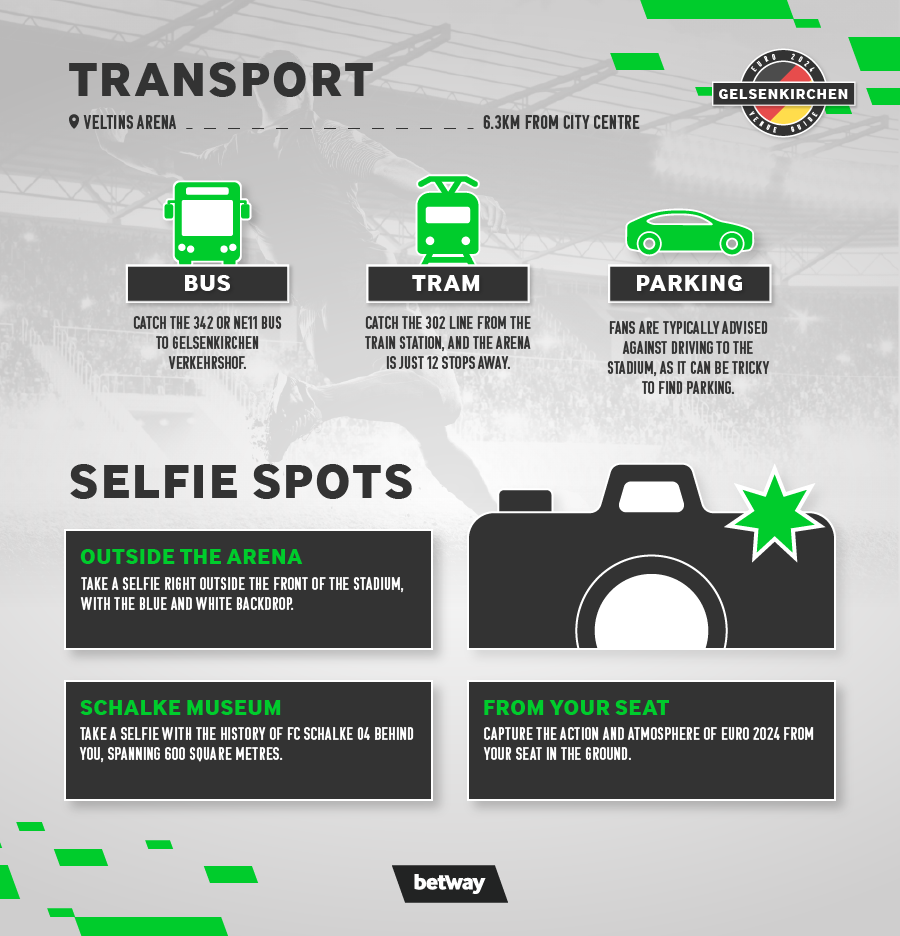
Where to eat in Gelsenkirchen
Gelsenkirchen is an extremely affordable city to eat in, with a meal costing around €11, or a three-course dinner for two approximately €70.
Plus, with domestic beer costing around €4.10 for half a litre, and a cappuccino costing €3.20; you won’t need to budget too much for food and drink. Here are just a few of our favourite restaurants in and around the city:
· German: With 4.7 stars on Google from 1,150+ reviews, Waldhaus am See uses only the highest quality ingredients for traditional German dishes including schnitzel and skewers, alongside a selection of other popular European dishes.
· Italian: 2.5km away from Veltins Arena, Hugo Trattoria Villa Italia offers a wide selection of pizza and pasta dishes, with veggie options available too, with 900+ Google ratings of 4.5.
· Greek: From stifado to souvlaki, if you’re in the mood for Greek food, head to Diosmos, which has a Google rating of 4.7, based on 680+ reviews.
· Japanese: One of the top-rated Japanese restaurants in the city, DoNg Sushi scores 4.8 from 300+ Google reviews, and offers a selection of sashimi, nigiri, tempura, and more.
· Burgers: Sometimes, you just can’t beat a burger before a match. Burger Brothers is a chain offering beef, chicken, and veggie burgers, alongside milkshakes and more; with a 4.8 rating from 300+ Google reviews.
The best döner kebabs in Gelsenkirchen
The ultimate fast-food feast, Berlin might be known as the doner kebab capital of the world, but Gelsenkirchen sure gives it a run for its money! If you’re in search of a kebab pre- or post-game, make sure you check out these places:
· Arena Kebap Restaurant: 4.5-rated on Google, from 360+ reviews
· Kebap Haus: 4.5-rated on Google, from 180+ reviews
· Ibo’s Doner: 4.6-rated on Google, from 520+ reviews
· Hatipoglu Doner Kebab: 4.6-rated on Google, from 240+ reviews
· Anadolu Grill: 4.7-rated on Google, from 290+ reviews
Gelsenkirchen’s most picturesque photo spots
Often referred to as ‘the city of a thousand fires’ due to its mining history, Gelsenkirchen is a great city to visit, and there will be lots of places to visit in your down-time, in between the Euros.
· Schloss Horst: One of the oldest buildings in Westphalia, the renaissance façade makes it the perfect backdrop for a photo, but you can go inside too, to learn about the history. The castle was built in 1578, but for a while in the 20th of century, it was actually a nightclub!
· Musiktheater im Revier: A perfect example of post-war architecture, it’s a protected monument in Germany, and its imposing glass-cube design makes it the perfect place for a photo.
· Zeche Zollverein: Fans of industrial architecture should definitely visit here; a world heritage site that whilst technically sits in Essen, is just a 10-minute drive from Schalke. 8,000 miners used to work here, and it’s been dubbed as “the most beautiful coalmine in the world”, which we think is definitely worth a picture!
· Halde Rheinelbe: The city proudly embraces its mining past, and one of the best things to do in Gelsenkirchen is visit Halde Rheinelbe, in the Ückendorf district. Walk up the slagheap to the ‘Ladder to Heaven’ monument, designed by Herman Prigann.
· Halde Rungenberg: Another slagheap, climb 110-metres to reach the top and enjoy views of the countryside, and embrace the nature that’s slowly taking over, after years of industry.
The best day trips from Gelsenkirchen
Gelsenkirchen is a great place to spend your time during the 2024 Euros, but if you want to extend your stay, then rest assured there are a range of places you can easily visit from the city, to explore more of Germany and all it has to offer!
· Erzbahnbrücke: If you love getting out and about on a bike, then a two-hour drive out of Gelsenkirchen will take you to Erzbahnbrücke. Cycle down the old railway past mines and industrial architecture, and marvel at the scenery, as well as the impressive bridge structures., one of which is the longest bridge construction in Erzbahn.
· Eindhoven: If you fancy hopping over the border into the Netherlands, you can be in Eindhoven in two hours from Gelsenkirchen, where you can wander around the warehouse district, which houses many independent shops and cafes, as well as art galleries and a state park. If you like art, make a beeline for Van Abbemuseum.
· Neanderlandsteig: 1 hour 30 on public transport, if you want to spend the day hiking, there’s no better place to do it than at Neanderlandsteig. Depending on the route you choose, you can explore churches, forests, and even a WW2 bunker!
· Schloss Drachenburg: Arguably one of the most picturesque castles in all of Germany, you can reach Schloss Drachenburg in 2 hours by car, or 2.5 hours on public transport. Wander through its landscaped gardens, and marvel at the gothic blue rooftops, complete with gargoyles.
· Bonn: 1 hour 40 by train, Bonn is famed for its range of museums, beautiful buildings, and for being the birthplace of Beethoven. Head to Museum Mile, before visiting the imposing Poppelsdorf Palace.
Final things to know before visiting Gelsenkirchen for the Euros
To help your trip go as smoothly as possible, have a read up of the weather, language, and safety tips, so you’ll be fully prepped and ready for your holiday to Gelsenkirchen.
Weather
The summers are warm in Gelsenkirchen, with highs of 21-23 degrees Celsius throughout June and July. However, the evenings can dip to 11-14 degrees, so don’t forget to bring layers, as well as an umbrella, with 11 days of rain each month, predicted.
Language
As you’d expect, in Gelsenkirchen, German is the official language; and whilst you’ll find that most people there can speak English, it’s always great if you’ve got a few German phrases up your sleeve. Here are just a few to learn before you head over:
· Hallo (Hello)
· Bitte (Please)
· Tschüss (Bye!)
· Danke (Thanks)
· Entschuldigung (Excuse me)
· Sprechen sie Englisch? (Do you speak English?)
· Ich verstehe nicht (I don’t understand)
Payment
Ahead of your Euros 2024 trip to Gelsenkirchen, make sure you’re clued up on the tipping culture, and whether it’s cash or card that’s king.
· Tipping: If you had good service when out for food or drink, then it’s polite to tip 5-10% of your total bill.
· Cash or card: Whilst you’ll be able to use your card in most places, it’s always worth having a few euros to hand if you want to visit any independent stores, street food vendors, or local markets.
Hospitals
We hope you have a safe stay in Gelsenkirchen, but unfortunately, accidents can sometimes happen, so it’s always worth knowing where the nearest hospitals are, should you need them.
· Marienhospital: Located 5km south of Gelsenkirchen city centre, Marienhospital has 568 beds, and an emergency room, making it the largest hospital in the city.
There are other hospitals in and around Gelsenkirchen, but they don’t have emergency rooms, including Elisabeth Krankenhaus, and St. Josef-Hospital. It’s also worth noting down the emergency number for Germany (112), as well as the German word for hospital, which is ‘krankenhaus’.
Explore the other Euro 2024 host cities
Once you’ve read through our ultimate guide to Gelsenkirchen, you’ll have absolutely no issues with getting round the city for the Euros. And, if you’re planning on watching the matches in a few different cities, make sure you take a look at our other guides, which cover everything from key arena info, through to top things to do in each host city.
· Berlin
· Cologne
· Dortmund
· Hamburg
· Leipzig
· Munich

